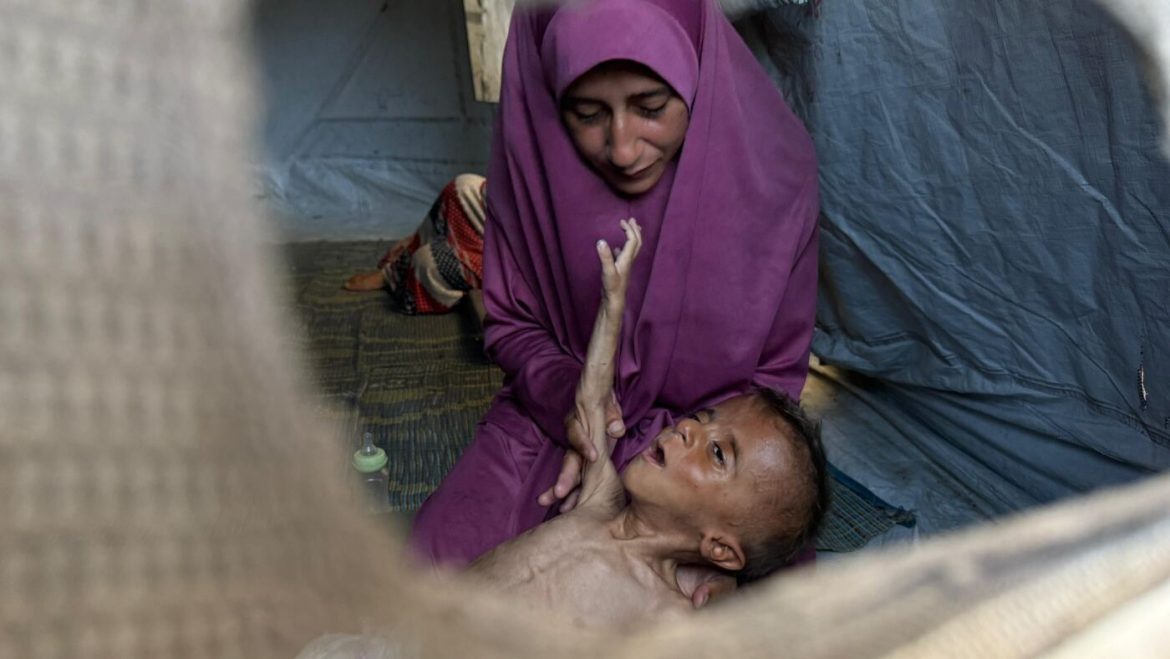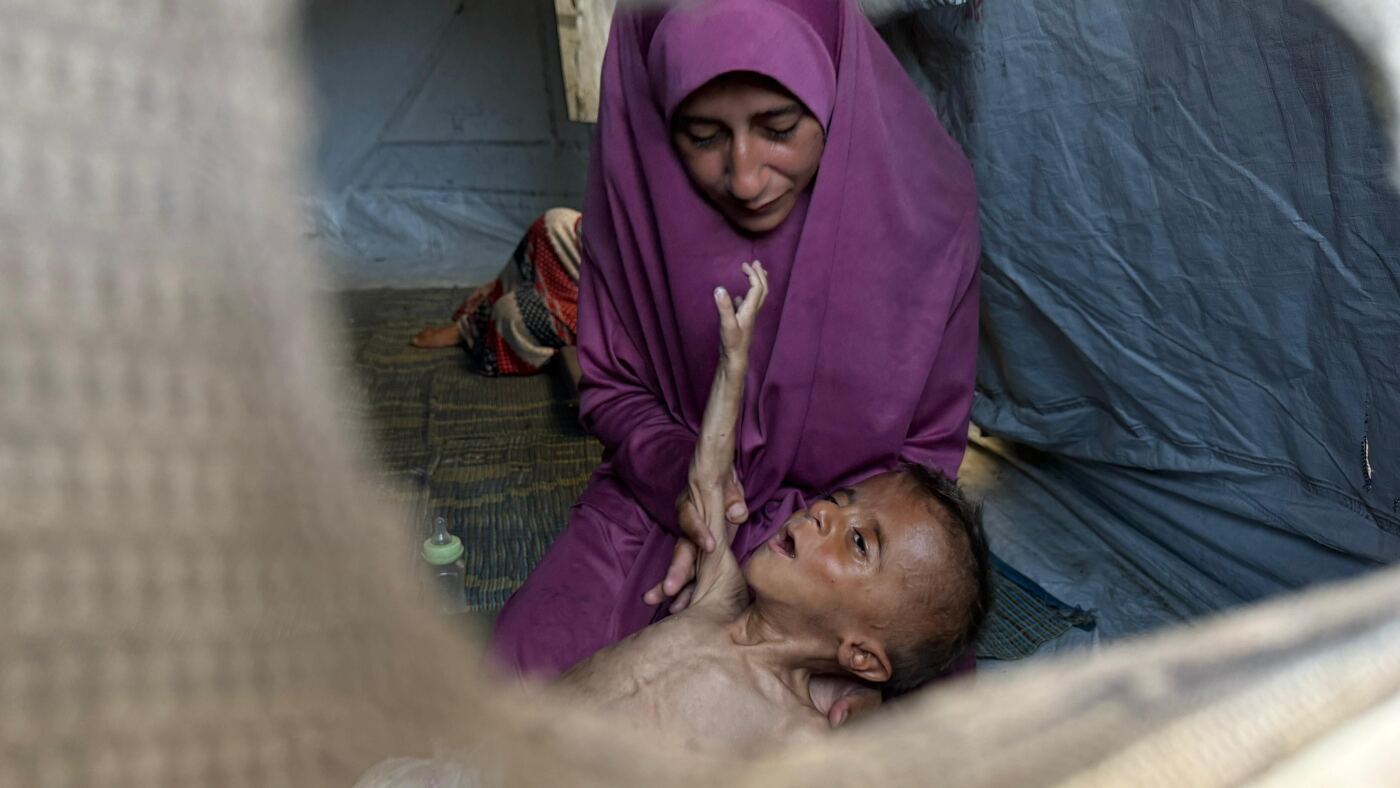The Human Cost of Conflict: Mohammad Al-Motawaq and the Crisis in Gaza
A Child’s Cry in the Shadows of War
Mohammad Al-Motawaq, an 18-month-old boy, is a name that should never have become a symbol of suffering. Yet, his emaciated body, weighing less than 10 pounds, has become an emblem of the silent crisis unfolding in Gaza. His story is not just about one child; it is a mirror reflecting the plight of thousands of children trapped in a cycle of violence, poverty, and despair. The image of Mohammad lying on a mattress in the Al-Shati refugee camp, his mother’s whispered pleas for an end to his suffering, is a stark reminder of the human cost of prolonged conflict.
The Anatomy of a Crisis
Mohammad’s starvation is not an isolated incident but a symptom of a much larger, systemic failure. The crisis in Gaza is a complex web of interconnected issues, each exacerbating the others. Understanding these factors is crucial to addressing the root causes of malnutrition and deprivation.
The Siege and Its Consequences
The blockade of Gaza, now in its 16th year, has created an artificial environment where basic necessities are scarce and unaffordable. The restrictions on the movement of goods and people have led to a severe shortage of food, medicine, and other essential supplies. The World Food Programme (WFP) has repeatedly warned of the dire situation, with over 80% of Gaza’s population relying on humanitarian aid for survival.
Economic Collapse and Poverty
The Gaza Strip’s economy has been systematically dismantled by years of conflict and blockade. Unemployment rates hover around 50%, and poverty is rampant. Families struggle to afford even the most basic food items, let alone a nutritious diet. The collapse of the economy has left many parents unable to provide for their children, forcing them to make impossible choices between food, medicine, and other necessities.
Infrastructure on the Brink
The repeated cycles of violence have left Gaza’s infrastructure in ruins. Water and sanitation systems are barely functional, leading to the spread of waterborne diseases. The lack of clean water and proper sanitation further exacerbates malnutrition, as children become more susceptible to infections that hinder nutrient absorption. The destruction of hospitals and medical facilities has also made it difficult for malnourished children to receive the care they desperately need.
Psychological Trauma and Its Impact
The constant exposure to violence and instability takes a heavy toll on the mental health of both children and parents. The psychological trauma of living in a conflict zone can lead to feeding difficulties in children and depression in parents, impacting their ability to care for their children properly. The fear and anxiety that permeate daily life in Gaza create an environment where children are not only physically malnourished but also emotionally deprived.
The Long-Term Consequences: A Generation at Risk
The immediate consequences of malnutrition are devastating, but the long-term effects can be even more profound. Chronic malnutrition during early childhood can lead to:
Stunted Growth and Development
Malnutrition can permanently stunt physical growth, leaving children shorter and weaker than their peers. This physical stunting is often accompanied by cognitive impairment, as the brain is particularly vulnerable to the effects of malnutrition during the first few years of life. Malnourished children are more likely to suffer from learning disabilities and reduced intellectual capacity, limiting their future opportunities.
Weakened Immune System
Malnourished children are more susceptible to infections and diseases, making them more likely to die from preventable illnesses. The weakened immune system leaves them vulnerable to a range of health problems, from respiratory infections to diarrhea, which can be fatal in a context where medical care is limited.
Increased Risk of Chronic Diseases
Studies have shown that malnutrition in early childhood can increase the risk of developing chronic diseases, such as diabetes and heart disease, later in life. The long-term health consequences of malnutrition can span a lifetime, affecting not only the individual but also the broader community.
A Call to Action: Breaking the Cycle of Suffering
The story of Mohammad Al-Motawaq is a call to action. It is a reminder that behind the headlines and political debates, there are real people struggling to survive. Addressing the crisis in Gaza requires a multifaceted approach that includes:
Ensuring Unfettered Access to Humanitarian Aid
All parties must ensure that humanitarian organizations have safe and unimpeded access to Gaza to deliver food, medicine, and other essential supplies. The current restrictions on aid are not only inhumane but also counterproductive, as they prolong the suffering and instability in the region.
Addressing the Root Causes of Food Insecurity
Long-term solutions must address the underlying causes of food insecurity, including poverty, unemployment, and damaged infrastructure. This requires a sustained commitment to economic development and reconstruction. Investing in Gaza’s economy is not just a humanitarian imperative but also a strategic necessity for regional stability.
Providing Mental Health Support
The psychological trauma of living in a conflict zone can have a devastating impact on children and families. Mental health services are essential to help them cope with their experiences and build resilience. Integrating mental health support into humanitarian aid efforts is crucial for the well-being of Gaza’s children.
Protecting Children from Violence
All parties must take steps to protect children from violence and ensure that they have access to education and other essential services. The protection of civilians, particularly children, must be a priority in any ceasefire or peace agreement.
A Moral Imperative: The World’s Responsibility
The story of Mohammad Al-Motawaq is a reminder that behind the headlines and political debates, there are real people struggling to survive. As global citizens, we have a moral imperative to act. We must demand that our leaders take concrete steps to address the crisis in Gaza and ensure that children like Mohammad have the opportunity to live healthy and fulfilling lives.
A Plea for Humanity
Mohammad Al-Motawaq’s name should not become just another statistic. It should serve as a constant reminder of the human cost of conflict and the urgent need for a just and lasting solution. His story is a plea for humanity, a call to break the cycle of violence and deprivation, and to create a future where all children can thrive, regardless of where they are born. Let us not allow his suffering to be in vain. Let his story inspire us to work towards a world where no child has to starve.


